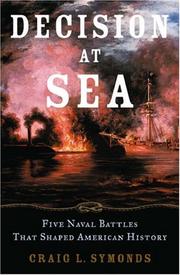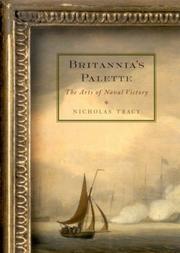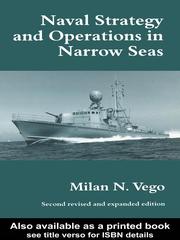| Listing 1 - 10 of 11 | << page >> |
Sort by
|
Book
ISBN: 1398818631 Year: 2022 Publisher: Vearsa
Abstract | Keywords | Export | Availability | Bookmark
 Loading...
Loading...Choose an application
- Reference Manager
- EndNote
- RefWorks (Direct export to RefWorks)
This book recalls 50 of the greatest naval battles to have been fought since medieval times, examining why they took place, who was in command and what impact they had on both the victors and the losers.From the Battle of Flanborough Head in 1779 to Jutland in 1916, Great Naval Battles also considers how changes in technology and battle tactics impact upon the outcome and what makes a decisive victory.Written by the renowned naval historian Dr Helen Doe, this is a fascinating analysis of maritime power through the ages.

ISBN: 128084373X 0198038283 9780198038283 9786610843732 6610843732 9781280843730 0195171454 9780195171457 0195312112 9780195312119 0199754888 0197712452 9780199754885 Year: 2005 Publisher: Oxford ; New York : Oxford University Press,
Abstract | Keywords | Export | Availability | Bookmark
 Loading...
Loading...Choose an application
- Reference Manager
- EndNote
- RefWorks (Direct export to RefWorks)
Symonds tells the story of five critical naval engagements that have changed the course of American history: Lake Erie (1813), Hampton Roads (1862), Manila Bay (1898), Leyte Gulf (1944) and the Gulf War (1991). He describes the significance of each action & the technical innovations that helped the victors.
Naval battles --- Battles, Naval --- Naval warfare --- War, Maritime --- Battles --- Naval history --- Sea control --- History. --- United States --- History, Naval --- History, Naval.
Book
ISBN: 9798400620089 9798216054832 1440871035 Year: 2019 Publisher: Westport, CT : New York : Praeger, Bloomsbury Publishing (US),
Abstract | Keywords | Export | Availability | Bookmark
 Loading...
Loading...Choose an application
- Reference Manager
- EndNote
- RefWorks (Direct export to RefWorks)
This book is an indispensable resource for readers who want to know the whole, comprehensive story of ancient naval warfare. The Blood-Drenched Sea describes all the naval battles and wars fought in the ancient Mediterranean. In one volume are the ships, crews, and leaders who determined the course of ancient history, along with the wars and battles, told through artifacts, extant literary and visual sources, and modern reconstructions-the Egyptian mortuary temple, the Minoan domain, the legendary sack of Troy, the expansion of Greeks throughout the Mediterranean, the Athenian victory over the Persians at Salamis, and the Athenian empire, ruined by one moment of superstition. Then the Romans learned how to build ships, man them, row in tiers, and command fleets, and the volume recounts their contributions to history as well. They fought three wars with Carthage that cost them hundreds of thousands of casualties and expenditures of vast wealth, and they conquered the whole of the Mediterranean. Meanwhile, Julius Caesar expanded the empire with the conquest of Gaul and the invasion of Britain, and his adoptive son, Octavian settled the question of who would rule the new empire by winning the naval battle at Actium.
Ancient history: to c 500 CE --- Ships, Ancient --- Naval battles --- Naval history, Ancient. --- History --- Mediterranean Region --- Mediterranean Sea --- History, Naval. --- Navigation --- History.
Book
ISBN: 1473856299 1473856434 9781473856431 1336280409 9781336280403 9781781592519 1526782197 9781526782199 9781473856295 Year: 2015 Publisher: Barnsley, South Yorkshire
Abstract | Keywords | Export | Availability | Bookmark
 Loading...
Loading...Choose an application
- Reference Manager
- EndNote
- RefWorks (Direct export to RefWorks)
Following the fall of Rome, the sea is increasingly the stage upon which the human struggle of western civilization is played out. In a world of few roads and great disorder, the sea is the medium on which power is projected and wealth sought. Yet this confused period in the history of maritime warfare has rarely been studied - it is little known and even less understood. Charles Stanton uses an innovative and involving approach to describe this fascinating but neglected facet of European medieval history. He depicts the development of maritime warfare from the end of the Roman Empire to the d
Naval battles --- Naval history --- Normans --- Northmen --- Historiography, Naval --- History, Naval --- Naval historiography --- Wars --- Historiography --- History --- Military history --- Sea-power --- Battles, Naval --- Naval warfare --- War, Maritime --- Battles --- Sea control --- To 1500
Book
ISBN: 0755609166 0857735985 9780857735980 9781848859852 1848859856 Year: 2014 Publisher: London ; New York : I.B. Tauris,
Abstract | Keywords | Export | Availability | Bookmark
 Loading...
Loading...Choose an application
- Reference Manager
- EndNote
- RefWorks (Direct export to RefWorks)
"In the century after 1530 the empires of the Habsburgs of Spain and the Ottoman Turks fought a maritime war that seemed destined to lead nowhere: lasting peace was as unlikely as final triumph, in part because the salient feature of this conflict was a violent form of piracy practiced by the 'corsairs' of North African and Malta. It was fundamentally a war of unequal means, since the Habsburgs of Spain had too few good warships and the Ottomans too many bad ones. Christendom and Islam engaged in a war fought largely through the exercise of private violence: the Hospitaller Knights of Malta and ghazi captains of North Africa succeeded in imposing their crusading ethos on the Mediterranean. If a degree of futility loomed over these campaigns, it was nevertheless true that the Mediterranean witnessed a sustained conflict which in scale and intensity was far greater than that of any contemporary form of warfare at sea. Moreover the sea was never abandoned as, until at least 1620, large galley fleets continued to patrol the inland sea. The raiding methods employed by Elizabethan 'seadogs' like Sir Francis Drake would certainly not have worked in this theatre of arms, as the defences in Italy and North Africa were much more formidable than those of the Atlantic. Phillip Williams begins with a detailed examination of the oared warships used in these campaigns. He then explores the structures of political and military organization and the role of geography and the environment in shaping the fighting; stressing that the Italian territories were of vital significance to the Habsburgs of Spain. He considers the cultural and historical outlook of protagonists such as the Habsburg rulers Charles V and Philip II and the Ottoman Sultan Suleyman the Magnificent, examining the extent to which the dictates of prudence triumphed over ideals of performing 'the service of God'. Providing a unique perspective on early modern maritime conflict, this book will be essential reading for all students and researchers of Mediterranean History and the early modern world."--Bloomsbury Publishing.
Naval battles --- Naval art and science --- Maritime history. --- History --- Fighting --- Naval administration --- Naval science --- Naval warfare --- Navy --- War, Maritime --- War --- Military art and science --- Navies --- Navigation --- Battles, Naval --- Battles --- Naval history --- Sea control

ISBN: 128286632X 9786612866326 0773575855 9780773575851 9781282866324 0773531130 9780773531130 Year: 2007 Publisher: Montreal [Que.] McGill-Queen's University Press
Abstract | Keywords | Export | Availability | Bookmark
 Loading...
Loading...Choose an application
- Reference Manager
- EndNote
- RefWorks (Direct export to RefWorks)
Britannia's Palette looks at the lives of British artists who witnessed the naval war against the French Republic and Empire between 1793 and 1815. This band of brothers, through their artistic and entrepreneurial efforts, established the images of the war at sea that were central to the understanding their contemporaries had of events - images that endure to this day. In this unprecedented book, Nicholas Tracy reveals the importance of the self-employed artist to the study of a nation at war. He includes lively accounts of serving officers, retired sailors, and academy-trained artists who, often under the threat of debtor's prison, struggled to balance the standards of art with the public desire for heroic, reassuring images. Containing over eighty illustrations, Britannia's Palette explores a varied and exciting collection of paintings that reveal the poignancy of the human experience of war.

ISBN: 1135777152 9786610063383 1280063386 1135777160 0203010337 9780203010334 9780714644257 0714644250 0714644250 0714653896 9780203044667 0203044665 9781136317941 1136317945 9781136318092 1136318097 9781136318016 1136318011 9780714648705 0714648701 9780415861748 0415861748 9781135777166 9781135777111 9781135777159 9780714653891 Year: 2003 Publisher: London Frank Cass
Abstract | Keywords | Export | Availability | Bookmark
 Loading...
Loading...Choose an application
- Reference Manager
- EndNote
- RefWorks (Direct export to RefWorks)
This work covers naval strategy and operations in narrow seas, contending that blue-water navies must revise the view that a fleet capable of defeating an adversary on the open ocean will automatically do the same in narrow seas.
Naval strategy. --- Naval tactics. --- Sea control. --- Coast defenses. --- Coastal defenses --- Defenses, Coast --- Harbor defenses --- Seacoast defenses --- Defensive (Military science) --- Fortification --- Military engineering --- Control of the sea --- Maritime operations (Naval forces) --- Naval operations --- Operations, Naval --- Naval art and science --- Naval strategy --- Naval tactics --- Strategy --- Tactics --- Naval battles --- Naval warfare --- War, Maritime --- Sea-power
Book
ISBN: 9811923612 9811923620 Year: 2022 Publisher: Singapore : Springer Nature Singapore : Imprint: Springer,
Abstract | Keywords | Export | Availability | Bookmark
 Loading...
Loading...Choose an application
- Reference Manager
- EndNote
- RefWorks (Direct export to RefWorks)
This book covers various strategic issues around maritime security in terms of how Indonesia has sought to implement its Global Maritime Fulcrum (GMF) vision, evaluating its regional impact within ASEAN. The Global Maritime Fulcrum’ vision was declared by President Joko Widodo to refocus Indonesia’s development paradigm to prioritize its maritime aspect in the Indo-Pacific. Divided across five pillars, namely: maritime culture, maritime resource management, maritime infrastructure and connectivity development, maritime diplomacy and maritime defense, the book presents that the implementation of this vision will doubtless have a significant regional impact, particularly in setting regional maritime agendas. In promoting an understanding of the challenges presented in implementing the Global Maritime Fulcrum and unpacking its multifaceted impact in the region, this book delves into Indonesia’s maritime vision, the existing maritime arrangements within ASEAN, and Indonesia’s interests in terms of its political economy relating to the maritime sector, strategic security issues, maritime diplomacy, and related regional power dynamics. Translated from Bahasa Indonesia into English, the book is relevant to scholars and policymakers in maritime studies, international relations, and regional studies relating to politics and power dynamics in Indonesia, specifically, and ASEAN more broadly.
Merchant marine --- Sea control. --- Security measures. --- Control of the sea --- Maritime operations (Naval forces) --- Naval operations --- Operations, Naval --- Naval art and science --- Naval strategy --- Naval tactics --- Strategy --- Tactics --- Naval battles --- Mercantile marine --- Marine service --- Shipping --- Asia—Politics and government. --- International relations. --- Shipping. --- Security, International. --- Law. --- Asian Politics. --- Foreign Policy. --- Maritime Economics. --- International Security Studies. --- International Relations. --- Acts, Legislative --- Enactments, Legislative --- Laws (Statutes) --- Legislative acts --- Legislative enactments --- Jurisprudence --- Legislation --- Collective security --- International security --- International relations --- Disarmament --- International organization --- Peace --- Marine shipping --- Marine transportation --- Maritime shipping --- Ocean --- Ocean traffic --- Ocean transportation --- Sea transportation --- Shipping industry --- Water transportation --- Communication and traffic --- Transportation --- Coexistence --- Foreign affairs --- Foreign policy --- Foreign relations --- Global governance --- Interdependence of nations --- International affairs --- Peaceful coexistence --- World order --- National security --- Sovereignty --- World politics --- Economic aspects --- Asia --- Politics and government. --- ASEAN.
Book
ISBN: 3319135503 3319135511 Year: 2016 Publisher: Cham : Springer International Publishing : Imprint: Springer,
Abstract | Keywords | Export | Availability | Bookmark
 Loading...
Loading...Choose an application
- Reference Manager
- EndNote
- RefWorks (Direct export to RefWorks)
This book offers an innovative approach to the analysis of the current crisis in the South China Sea. Moving beyond the spirit of the UN Convention on the Law of the Sea (UNCLOS), the mechanisms of which are limited to physical geography, it demonstrates how epistemological insights from the field of critical realist philosophy can reveal the importance of cultural and structural conditioning processes in social interactions, processes which shape the conditions for the emergence of crisis points along a spectrum of conflict and cooperation. The potential for conflict resolution and the emergence of new regions in Pacific Asia much depends on the nature of such interactions at many levels (political-economic, semiotic and cultural) based on perceptions of what constitutes the "common" versus a Sinicised version of "Lebensraum".
Environmental Sciences --- Economic History --- Law, General & Comparative --- Law, Politics & Government --- Earth & Environmental Sciences --- Business & Economics --- Law of the sea --- Sea control --- Regionalism --- Political aspects --- South China Sea --- International status. --- Strategic aspects. --- Control of the sea --- Maritime operations (Naval forces) --- Naval operations --- Operations, Naval --- High seas, Jurisdiction over --- Marine law --- Ocean --- Ocean law --- Sea, Law of the --- Law and legislation --- Biển Đông --- China Sea, South --- Dagat Timog Tsina --- Laut Cina Selatan --- Laut Tiongkok Selatan --- Laut Tjina --- Mar da China Meridional --- Minami Shinakai --- Nan Hai --- Nan Kai --- Nan Zhongguo Hai --- Thalē Čhīn Tai --- Naval art and science --- Naval strategy --- Naval tactics --- Strategy --- Tactics --- Naval battles --- International law --- Maritime law --- Territorial waters --- Environmental law. --- Genetic epistemology. --- Geography. --- Environmental Law/Policy/Ecojustice. --- Epistemology. --- Economic Geography. --- Cosmography --- Earth sciences --- World history --- Developmental psychology --- Knowledge, Theory of --- Environment law --- Environmental control --- Environmental protection --- Environmental quality --- Environmental policy --- Law --- Sustainable development --- Environmental policy. --- Economic geography. --- Geography, Economic --- World economics --- Geography --- Commercial geography --- Epistemology --- Theory of knowledge --- Philosophy --- Psychology --- Environment and state --- Environmental management --- State and environment --- Environmental auditing --- Government policy
Book
ISBN: 9462652481 946265249X Year: 2018 Publisher: The Hague : T.M.C. Asser Press : Imprint: T.M.C. Asser Press,
Abstract | Keywords | Export | Availability | Bookmark
 Loading...
Loading...Choose an application
- Reference Manager
- EndNote
- RefWorks (Direct export to RefWorks)
This book considers the international law applicable to maritime interception operations (MIO) conducted on the high seas and within the context of international peace and security, MIO being a much-used naval operational activity employed within the entire spectrum of today's conflicts. The book deals with the legal aspects flowing from the boarding and searching of foreign-flagged vessels and the possible arrest of persons and confiscation of goods, and analyses the applicable law with regard to maritime interception operations through the legal bases and legal regimes. Considered are MIO undertaken based on, for instance, the UN Collective Security System (maritime embargo operations), self-defence and (ad-hoc) consent, and within the context of legal regimes various views are provided on the right of visit, the use of force and the use of detention. This volume, which has contemporary naval operations as its central focus and structures the analysis as a sub-discipline of the international law of military operations, will be of great interest both to academics, practitioners and policy advisors working or involved in the field of military and naval operations, and to those professionals wanting to learn more about the international law of military operations, naval operations, and the law of the sea and maritime security. Martin Fink is a naval and legal officer in the Royal Netherlands Navy. .
Maritime law. --- Arrest of ships. --- Sea control. --- Control of the sea --- Maritime operations (Naval forces) --- Naval operations --- Operations, Naval --- Naval art and science --- Naval strategy --- Naval tactics --- Strategy --- Tactics --- Naval battles --- Arrest of ships --- Ships --- Ships, Arrest of --- Admiralty --- Attachment and garnishment --- Maritime law --- Security (Law) --- Law, Maritime --- Marine law --- Merchant marine --- Merchant ships --- Navigation --- Navigation laws --- Shipping --- International law --- Commercial law --- Law of the sea --- Law and legislation --- Arrest --- Public safety. --- International Humanitarian Law, Law of Armed Conflict. --- Human Rights. --- Law of the Sea, Air and Outer Space. --- International Economic Law, Trade Law. --- International Environmental Law. --- Crime Control and Security. --- Safety, Public --- Human services --- International humanitarian law. --- Human rights. --- Law of the sea. --- International law. --- Trade. --- International environmental law. --- International environmental law --- Common heritage of mankind (International law) --- Law of nations --- Nations, Law of --- Public international law --- Law --- High seas, Jurisdiction over --- Ocean --- Ocean law --- Sea, Law of the --- Territorial waters --- Basic rights --- Civil rights (International law) --- Human rights --- Rights, Human --- Rights of man --- Human security --- Transitional justice --- Truth commissions --- Humanitarian conventions --- International humanitarian law --- War (International law)
| Listing 1 - 10 of 11 | << page >> |
Sort by
|

 Search
Search Feedback
Feedback About UniCat
About UniCat  Help
Help News
News